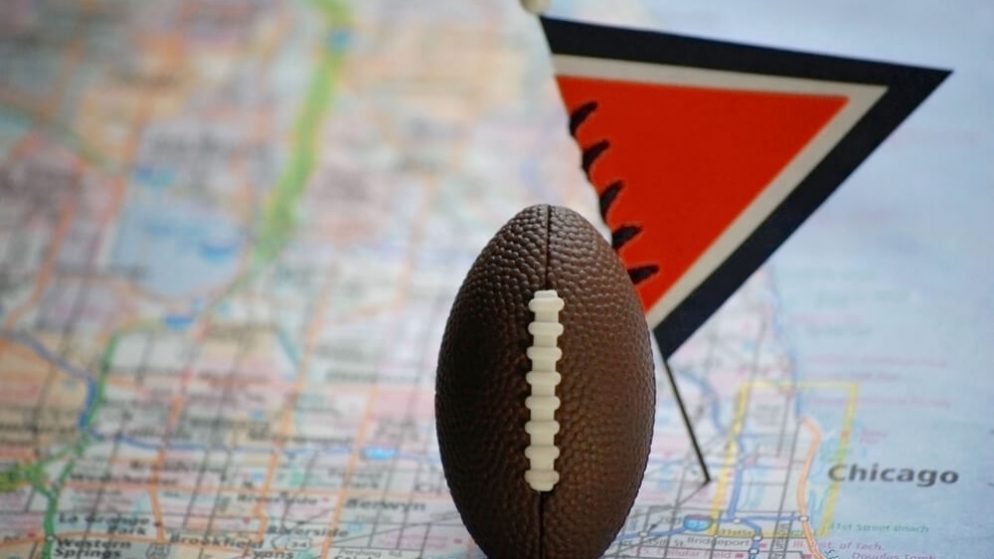

A recent registered voter’s study conducted by ARW Strategies found that most residents from Arlington Heights are fine with the Chicago Bears moving to their neighbourhood in the coming years. The poll was carried out after a petition was launched to authorize an Anti-Corporate Welfare Tax Ordinance.
The Anti-Corporate Welfare Tax Ordinance was instigated to prevent the use of taxpayer-funded grants to entice the NFL team’s move to the Chicago suburb. The petition was launched to essentially stop financial incentives toward assisting the Bears to construct their new stadium in Arlington Heights.
The ordinance was launched by a firm known as Americans for Prosperity whose goal is to ensure that taxpayer dollars within the village of Arlington Heights are put to good use. Primarily, the firm is looking to prevent the use of taxpayer funds in ways that are deemed disparaging or unfair to the community.
Based on the results of the survey, at least 54% of the respondents supported the Anti-Corporate Welfare Tax Ordinance. According to the survey, residents of Arlington agreed that they shouldn’t be held responsible for footing the Chicago Bears’ move as taxpayers. The poll also showed that since the legalization of sports betting, the Bears’ wealth had grown greatly.
As such, considering the NFL’s wealth, the team should be capable of setting up its new home without taxpayer funds. Sportsbooks and teams like the Bears have been partnering up over the last few years as sports betting has continued to expand. Given the enthusiasm surrounding sports betting, it’s in the best interest of all involved to figure this out.
What we cover
The Bears are intent on changing homes
Last year in September, the Chicago Bears signed a purchasing agreement for the Arlington International Racecourse. Under the terms of this agreement, the Bears would part with approximately $197.2 million for the 326-acre property. This is the land that the Bears expect to use for the brand-new stadium.
However, as soon as the Bears signed the purchase agreement to purchase the land for the stadium the City of Chicago responded with a 50-page proposal plan that would see Soldier Field renovated in a bid to keep the Bears in downtown Chicago instead of Arlington Heights. The city’s mayor, Lori Lightfoot, has been determined to keep the team playing at Soldier Field past 2033, which is when the lease expires.
But the Bears have made it clear that the legendary team is motivated to move from Soldier Field to the newly constructed stadium in Arlington. If the Bears choose, they could easily break their 2033 lease by paying the city a release clause worth $84 million. In an effort to keep the Bears at Soldier Field, the mayor unveiled 3 new proposals that will see several renovations made including adding a potential dome over the lakefront field.
But the mayor’s proposal area to be nothing more than a Hail Mary, and a desperate one at that. Simply put, the Chicago Bears claim that Soldier Field has ceased to provide the team with the modern facility it needs to keep thriving.
As part of the mutual agreement that the Bears have with the seller of the property, the Bears have not been pursuing alternative stadium deals or sites apart from the new development in Arlington Park. As such, the Bears’ purchase will take a while to be finalized thanks to the litany of logistical, monetary, and legal loops that need to be handled.
Why are the Bears so intent on leaving Soldier Field?
No one has a clear picture of why the Chicago Bears are so intent on constructing a new home. However, there has been a lot of speculation as to the many reasons why the Bears want to stop calling Soldier Field in their home stadium. The team has called the stadium home since 1971 and is one of the oldest stadiums in the NFL.
For instance, Soldier Field currently has a capacity of 61,500 and is the smallest stadium in the NFL. As one of the smaller stadiums, Soldier Field is not allowed to host major sporting events such as the Super Bowl or the World Cup. In 2003, the stadium also received a botched renovation that turned the venue into an eyesore.
The major’s planned renovation for the stadium is expected to cost the taxpayers anything between $900 million and $2.2 billion. With the rising costs of living continuing to skyrocket and as threats of the recession continue to loom, taxpayers aren’t willing to fund the plans.
Plus, the Chicago Bears need a bigger stadium to get out of the profitability rut that the team currently finds itself in. According to team officials, the Bears’ lease agreement that allows the team to rent Soldier Field from the city has prevented the team from making profits. The city has been taking a chunk of the revenue the team generates, which has prevented the team from extracting the full profits from their games and events.
The Bears also stand as one of the 2 teams in the NFL that do not have the naming right to profit from their stadium. Soldier Field was named as a tribute to the fallen soldiers, which has left the team without a naming right sponsor. For instance, competitor Dallas Cowboys generates close to $25 million each year for naming their stadium the AT&T Stadium and the Bears simply want to be able to do the same.
To make things worse, the Bears also do not control any restaurants or businesses situated around Soldier Field. With this new stadium in Arlington Heights, the Bears will have plenty of room to build plenty of businesses so that the new stadium can start being a lucrative cash cow.
Final Thoughts
Once the purchase has been finalized Bears fans will be in for one of the biggest changes in their lives. Switching stadiums may seem like a small task. However, changing homes from a relic that has been steeped in football history to a more modern facility distanced from the city will also be an emotional adjustment for all Bears fans.
For the residents, moving away presents a logistical challenge that will likely affect attendance. The Bears’ new home is at least 30 miles away from Soldier Field, which will make it harder for fans to attend the games live.






